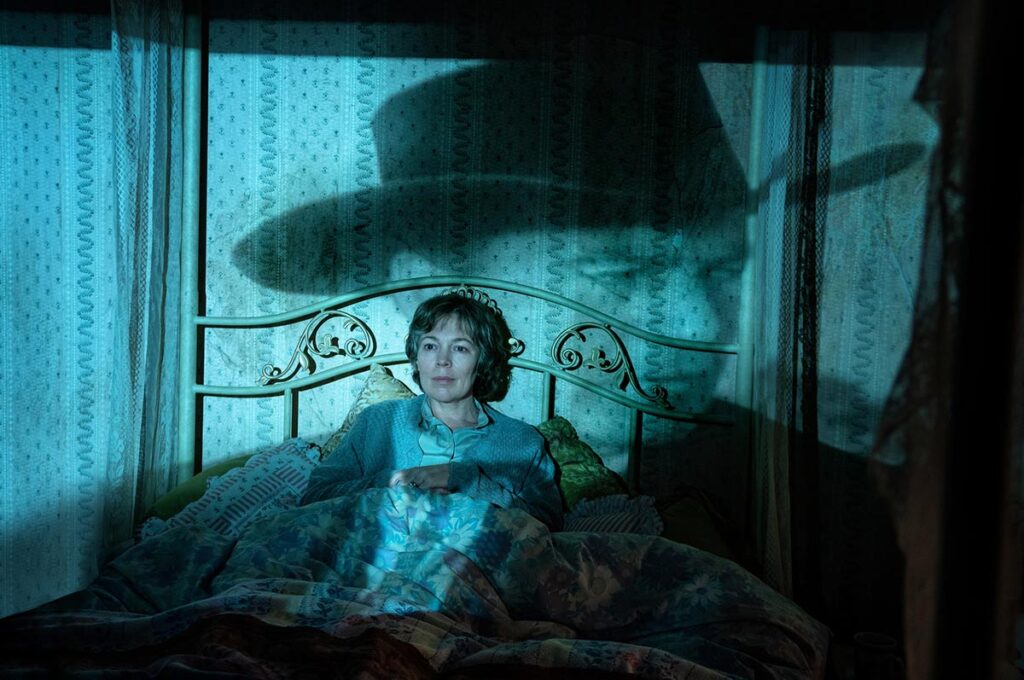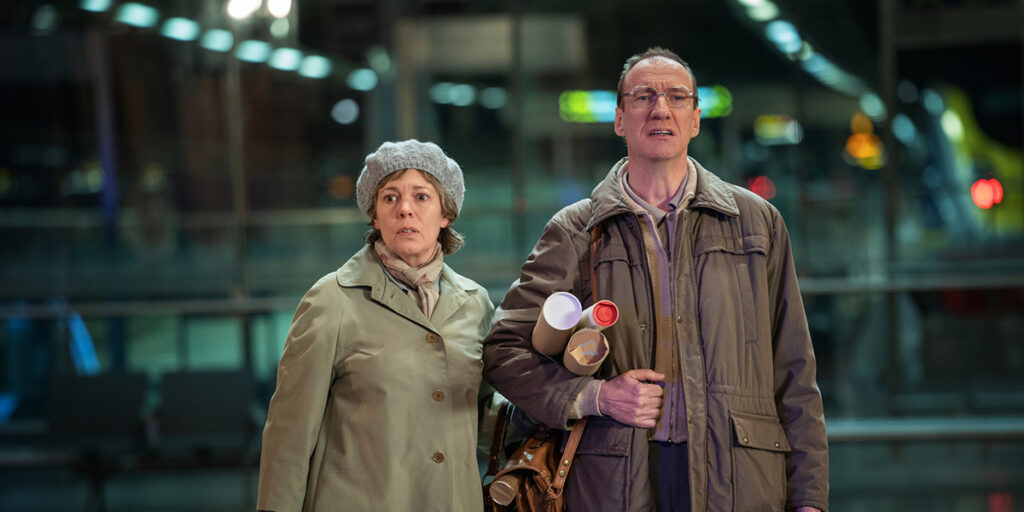Landscapers tells the fascinating tale of a double murder in some of the most inventive ways audiences have seen in years.
The amount of true crime shows that have been sweeping screens over the last few years is easily overwhelming. We have had well known stories, such as the story of Elizabeth Holmes in The Dropout, and stories that audiences have only been aware of after their on-screen adaptations, such as in Netflix’s Unbelievable. While Landscapers is certainly an addition to the surplus of this sub-genre, it is completely in a league of its own.
Landscapers is based on the true story of Susan and Christopher Edwards, played by Olivia Colman (The Lost Daughter) and David Thewlis (I’m Thinking of Ending Things) respectively. The series opens with a statement that reads, “In 2014 Susan and Christopher Edwards were convicted of murder and sentenced to a minimum of 25 years in prison. To this day they maintain their innocence.” Throughout the series, we follow this couple as they turn themselves in to the police, get prosecuted, and eventually go to trial where the court rules in their favor.
Even though this plot description may not be the most unique when it comes to true crime dramas, the execution of events in the series is something audiences have never seen in a show of this genre. There is almost a surreal element to the whole show. Even though we get to see the proper sequence of events, there is so much creative liberty that is taken in order to discuss these events that, at times, it is hard to tell if Landscapers is fully based on a true story. For example, with each episode there is a strong shift in tone. One episode plays out like a western, while another might seem like a dreamlike retelling of events. The look of the show is mainly based on a character’s emotional state, so when these drastic changes occur, it is not random, but more related to how a given character is experiencing the events as the series progresses. This bold choice of direction mainly works in the show’s favor because it makes Landscapers a truly fascinating watch.
Having this more unique style of storytelling is not an easy job, as it requires all of the filmmaking departments to be on top of their game. The production design and cinematography, in particular, are on full display throughout the series and rightfully so. The series utilizes techniques to ensure that, whenever a character is talking, in any given scene, audiences are transported to that particular character’s point of view. There are scenes where a character talks about their dark thoughts and the lighting boldly turns to red, and scenes where characters literally get up and walk to a different part of the set on camera to properly discuss something that happened in the past. Landscapers has a lot of tricks up its sleeve, and when those tricks are pulled off correctly, the show is a masterwork from a creativity and crafts perspective.

With that being said, sometimes the show’s ambition gets the better of it. As the series progresses, some of the crafts get amped up to a point where the show loses focus on its central plot, the double homicide. By the end of the show, it becomes hard to even fully understand what happens at the end of the court case, even though we are reminded that the central couple still maintains their innocence at the end of every episode. Especially in the last installment of the four episode series, the director’s vision of telling this story in a truly unique faction makes the overall series feel isolated.
As she consistently is, Oliva Colman is nothing short of brilliant in Landscapers, proving once again that she is one of the best working actresses alive, delivering an utterly complex and heartbreaking leading performance. As she proves time and time again, she is one of the best working actresses today and delivers an utterly complex and heartbreaking leading performance. Due to how some of the show is seen through her subjective point of view, we get to see Colman shine as she portrays a whirlwind of emotions, since her character is going through an unimaginable ordeal. There is one scene in particular where she gives a beautiful monologue about how she is not fragile, she’s broken, which is one of the most powerful parts of the whole series. Even though she has become an awards darling in recent years, this role, just like her others, deserves immense praise.
While both Olivia Colman and her co-lead David Thewlis give strong individual performances, one of the show’s weaker points has to do with the main romance between them. It is not necessarily the acting that makes the romance less compelling than the rest of the series, but more the writing. Even though this is a true-crime drama at its core, it is treated as a love story for the majority of the series. The show is very reliant on the audience to believe that this couple is head over heels in love for each other, but we don’t get enough front matter to understand why they are so in love. This reliance becomes especially problematic towards the end where the romance gets more screen time over the crime which the show supposedly revolves around.
Landscapers definitely chooses style over substance, and when it’s done correctly, it most certainly strives at being a groundbreaking example of what a true-crime series can look like. It is one of the most interesting shows to be released within the past few years, especially from a filmmaking perspective, and will hopefully be able to get some awards recognition in the future for its strange, yet fascinating style. For lovers of true-crime, Olivia Colman, and arthouse cinema alike, Landscapers does have something for everyone and will hopefully be able to fascinate audiences with Edwards’ story for years to come.
Landscapers is now available to watch on HBO Max (US) and on Sky and Now (UK and Europe). The show has been nominated for a BAFTA TV Award for Best Mini-Series.

